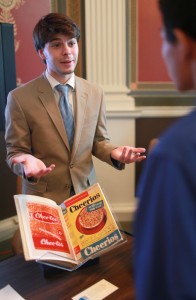If someone set a bowl of cheese curls in front of you and declared it “breakfast,” would you be able to discern it from cereal?
Even if you’re the type who likes cold pizza at 7 a.m., odds are you would not be too quick to pour on the milk and dive in with a spoon. But today, at the Library of Congress, team members of the Library’s Junior Fellows Summer Interns class of 2012 assigned to the Law Library laid out the 1952 trademark dispute between the Frito Co. (now known as Frito-Lay) and General Mills, the maker of the breakfast cereal Cheerios.
The Law Library fellows were among 38 such interns working in more than 20 Library divisions for 10 weeks this summer, creating archival finding aids, organizing elements of collections and in the process finding more than 130 interesting items, ranging from an opera notated in unorthodox fashion – with curved staffs – to a previously unknown demo recording by blues legends Sonny Terry and Brownie McGhee.
Back to our food fight. The Frito Co.’s owners had created “Chee-tos,” a cousin to their popular snack food, Fritos. Both involved corn as the basis, but Chee-tos, as the name suggested, also contained cheese.
The Frito Co. applied for a trademark, but was halted by a protest from General Mills, which suggested that the similarity between the two product names (both involving “chee” and “o”) constituted infringement of the existing Cheerios trademark. The U.S. Court of Appeals for the 5th Circuit barred the Frito Co. from trademarking Chee-tos.
It wasn’t over, according to Junior Fellow Mari Gavin of Richmond, Va., a graduate of the College of William & Mary who’s applying to law school. (Fellow fellow Wesley Verge also was instrumental in unearthing the Chee-tos case.) Two more rounds of appeals later, the Frito Co. won its trademark, which is why we are all munching both (trademarked) food products lo these many decades later.
Among their many accomplishments, this year’s crew of Junior Fellows detailed the provenance of a rare book of fables in the Library’s Lessing J. Rosenwald Collection
of rare books; organized the Library’s collection of operas written since 1990; worked to bring voice recordings of major poets to the Library’s website; and added descriptive detail to items being placed on the World Digital Library website. They found fun and fascinating elements in the Copyright collections and preserved fragile maps.
Some of the fellows will go to graduate school, others will return to undergraduate school or scout for jobs; but some were fascinated enough by their weeks at the Library to consider careers in librarianship – for which we can all be grateful.


